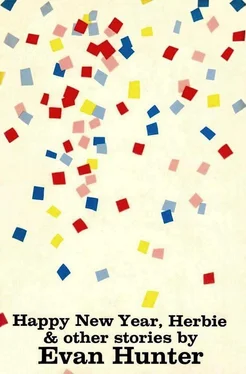Emil walked to the ring and, grinning, turned to Jimbo and said, “Want to forfeit?”
“Shoot,” Jimbo said.
Emil grinned again, crouched in the dust, picked up his big marble, and shot. He knocked two more marbles out of the ring in succession and then missed the third by a hair, and that was the end of the game. I say that was the end of the game only because Jimbo then shot and knocked out all the remaining marbles in the circle. And then, because he had won this round, it was his turn to shoot first in the next round. He shot first, and he knocked four marbles out with his opening blast, and then proceeded to clean up the ring again. And then, because he’d won this round as well, he shot first again, and again cleaned up the ring, and he kept doing that all through the rest period until he’d won seventy-five marbles from Uncle Emil.
Uncle Emil muttered something about having a little rheumatism in his fingers, throwing his game off, and Jimbo listened sympathetically while he added the seventy-five marbles to the collection in his bulging cigar box. That afternoon Emil came back with a hundred marbles he had scrounged from the kids, and Jimbo won them all in a matter of a half hour. That evening Jimbo went to the mess hall to pick up a cardboard carton for his marble winnings. And, also that evening, he became a celebrity.
I guess I was the only person, man or boy, in that camp who didn’t want to try beating Uncle Jimbo in the hectic weeks that followed. To begin with, I am not a very competitive fellow, and besides, I only knew how to play immies, not marbles. Marbles required a strong thumb and a fast eye, Jimbo explained to me. My thumbs were pretty weak and my eyes were tired from staring across the lake trying to catch a glimpse of a distant figure I could identify as Becky. But everyone else in camp seemed to possess powerful thumbs and 20/20 vision, and they were all anxious to pit these assets against the champion. When you come to think of it, I suppose, champions exist only to be challenged, anyway. The challengers in this case included everybody, and all for different reasons.
Uncle Ronnie was a counselor whom everyone, including the kids, called Horizontal Ronnie because his two favorite pursuits both required a bed and a horizontal position. He wanted to beat Jimbo because the quarantine had deprived him of the satisfying company of a girl named Laura in Camp Lydia. Jimbo won two hundred marbles from Ronnie in an hour of play.
Uncle Dave taught mathematics at Evander Childs High School, and he thought he had figured out a foolproof system that he wanted to try in practice. The system worked for fifteen minutes, at the end of which time Jimbo blasted the game from its hinges and then barged on through to win a hundred and fifty marbles.
Uncle Marvin, too, had his own reason for wanting to beat Jimbo. Before the season had begun, when Marvin was still hiring counselors, he had offered Jimbo twelve hundred dollars for the job. Jimbo had held out for thirteen hundred, which Marvin eventually and grudgingly paid him. But the extra hundred dollars rankled, and Marvin was determined to get it back somehow.
You may think it odd that he decided to get back his hundred dollars by winning marbles from Jimbo. After all, marbles are marbles, and money is money. But a very strange thing had happened in the second week of the madness. Marbles, which up to that time had only been round pieces of colored glass, suddenly became the hottest item of currency in the camp’s vast and complicated trading system. Before then, dimes were very hot property because the Coke machine in the counselors’ shack took only dimes. The kids weren’t allowed to enter the counselors’ shack, nor were they allowed to drink Cokes, all of which made it absolutely necessary for them to have dimes so they could sneak into the counselors’ shack and drink Cokes. Almost every letter home, before the marble madness began, started with the words, “Dear Mom and Dad, I am fine. Please send me some dimes.” But suddenly, because Jimbo kept winning marbles with such frequency, there was a shortage of marbles in the camp. Marbles became a precious commodity, like gold or silver, and the basis of the camp economy. If you had marbles, you could trade them for all the dimes you needed. You could, in fact, get almost anything you wanted, if you only had marbles. Uncle Jimbo had a lot of marbles. Uncle Jimbo had a whole damn suitcase full of them, which he kept locked and on a shelf over his bed. He was surely the richest man in camp.
He became even richer the afternoon he played Uncle Marvin and won five hundred marbles from him, a blow from which Marvin never recovered. By this time, beating Jimbo had become an obsession. Jimbo was the sole topic of camp discussion, overshadowing the approaching Color War, eclipsing the visit of a famous football player who talked about the ways and means of forward passing while nobody listened. The counselors, the kids, even the camp doctor, were interested only in the ways and means of amassing more marbles to pit against Jimbo’s growing empire. They discussed shooting techniques, and whether or not they should play with the sun facing them or behind their backs. They discussed the potency of the mass shot as against a slow deliberate one-at-a-time sort of game. They discussed different kinds of shooters, the illegality of using steelies, the current exchange rate of pureys. The kids loved every minute of it. They awoke each morning brimming with plans for Jimbo’s ultimate downfall. To them, beating him was important only because it would give them an opportunity to prove that adults, especially adult counselors, were all a bunch of no-good finks.
On Monday of the third week of the madness, the smart money entered the marbles business — and the gambling element began taking over.
But before that, on Sunday night, I broke quarantine.
I am usually a law-abiding fellow, and I might never have broken quarantine were it not for Horizontal Ronnie, who, I later came to learn, had very definite criminal leanings.
“Look,” he said to me, “what’s to stop us from taking one of the canoes and paddling over to the other side?”
“Well,” I said, “there’s a polio scare.”
“Don’t you want to see What’s-her-name?”
“Rebecca.”
“Yeah, don’t you want to see her?”
“Sure I do.”
“Has every kid in this camp and also in Camp Lydia, by Marvin’s own admission, in his very own words, been inoculated against polio?”
“Well, yes,” I said.
“Then would you mind telling me how there is a polio scare?”
“I don’t know,” I said.
“Fine. I’ll meet you at the boat dock tonight at nine o’clock. I’ll take care of getting word to the girls.”
I guess I didn’t trust him even then, because I took care of getting word to Becky myself that afternoon, by sending over one of my notes tied to an empty milk can. That night, at nine o’clock on the dot, Ronnie and I met at the boat dock and silently slipped one of the canoes into the water. We didn’t talk at all until we were in the middle of the lake, and then Ronnie said, “We’ll come back around eleven. Is that all right with you?”
“Sure,” I said.
“Boy, that Laura,” he said, and fell silent again, apparently contemplating what was ahead. Laura, whom I had only seen once or twice before the quarantine, was a very pretty blond girl who always wore white sweaters and tight white shorts. She also wore a perfume that was very hard to avoid smelling, and the few times I had seen her was in the counselors’ shack where she kept playing the “Malaguena” over and over again on the piano. She was a very mysterious girl, what with her sweater and shorts and her perfume and her “Malaguena.” She was eighteen years old.
Читать дальше












